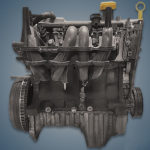The 0.9-liter 3-cylinder Renault H4Bt or 0.9 TCe 90 engine has been produced since 2012 and is installed on the group’s popular models manufactured under the Renault, Nissan and Dacia brands. This motor can also be found under the hood of modern Smarts, which are Twingo clones.
The TCe line includes engines: H4Bt, H4Dt, H5Dt, D4Ft, H5Ft, H5Ht, H4Jt, M5Mt, M5Pt, F4Rt.
In 2012, Renault introduced its new 0.9-liter turbo engine of the TCe family. It is an all-aluminum 3-cylinder engine with a 12-valve DOHC cylinder head, intake camshaft dephaser, Mitsubishi low-response turbocharger, timing chain drive and advanced variable displacement oil pump. To reduce friction, an anti-friction coating is applied to all internal surfaces.
This power unit was originally designed for installation on not the most expensive models, including those manufactured under the Dacia brand, so there is distributed fuel injection. In addition to engines with an index of 400 for Clio, 401 for Twingo or 410 for Dacia, a more efficient version of the 450 has recently appeared with a capacity of 110 hp, 170 Nm.
Specifications
| Production years | since 2012 |
| Displacement, cc | 898 |
| Fuel system | distributed injection |
| Power output, hp | 90 – 93 |
| Torque output, Nm | 135 – 140 |
| Cylinder block | aluminum R3 |
| Block head | aluminum 12v |
| Cylinder bore, mm | 72.2 |
| Piston stroke, mm | 73.1 |
| Compression ratio | 9.5 |
| Hydraulic lifters | no |
| Timing drive | chain |
| Phase regulator | on the intake manifold |
| Turbocharging | yes |
| Recommended engine oil | 5W-30, 5W-40 |
| Engine oil capacity, liter | 4.1 |
| Fuel type | petrol |
| Euro standards | EURO 5/6 |
| Fuel consumption, L/100 km (for Renault Clio 2014) — city — highway — combined |
5.7 4.1 4.7 |
| Engine lifespan, km | ~200 000 |
| Weight, kg | 86 |
The engine was installed on:
- Renault Captur 1 (J87) in 2018 – 2019;
- Renault Clio 4 (X98) in 2012 – 2020;
- Renault Twingo 3 (C07) in 2014 – 2020;
- Dacia Logan 2 (L52) since 2012;
- Dacia Logan 2 MCV (R52) since 2012;
- Dacia Sandero 2 (B52) since 2012;
- Dacia Sandero 2 Stepway (B52x) since 2012.
Disadvantages of the Renault H4Bt engine
- On specialized forums, many cases of engine failure on a run of up to 150,000 km have been described. First, a small oil consumption appears, then it simply turns the liners.
- A thin timing chain is often stretched already for a run of 100 – 150 thousand kilometers. However, even earlier, the phase regulator may crackle here, and its replacement is very expensive.
- There were a number of engine firmware due to floating rpm and difficult starting in winter. Periodically there are complaints about the oil burner or the rapid wear of the oil pump chain. Also, when the ribbed belt breaks, its pulley on the crankshaft is destroyed very quickly.






